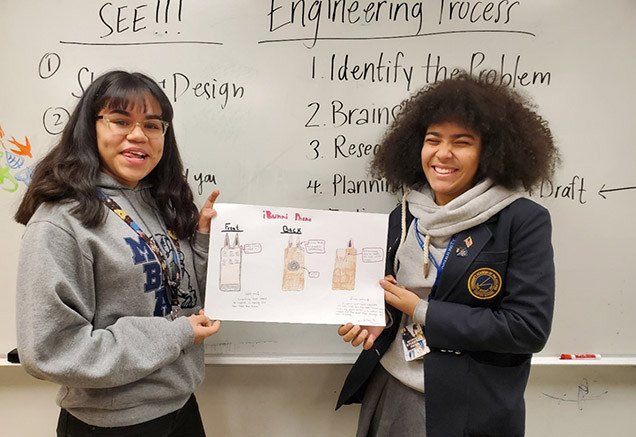Engineering WINS
Engaging Women in Engineering: Training Mentors to Make a Difference (EngWINS) NSF Grant #1849735

The Academy of Natural Sciences of Drexel University is modifying its nationally recognized Women In Natural Sciences (WINS) program to meet the needs of female students and professionals in engineering. In collaboration with Drexel's College of Engineering and School of Education and the Philadelphia Education Fund, the Engineering WINS (EngWINS) program is developing the capabilities of working engineers and faculty to serve as mentors in a new initiative to develop interest, self-efficacy and persistence in engineering careers among urban high school women in grades 9–12 (100% low income; 85% minoritized youth).
WINS already has a proven track record of increasing the number of students pursuing STEM majors and careers. In 2019, the National Science Foundation awarded WINS with a grant to increase participant interest in pursuing higher education and careers in engineering. We want to dismantle implicit biases that discourage students from considering engineering as an option. We are modifying our curriculum to incorporate engineering design concepts as they relate to the natural sciences, allowing participants to explore engineering in conjunction with the environmental. Participants will then be paired with mentors in engineering, providing more immersive experiences in various branches of engineering.
Many studies demonstrate that when mentors and mentees are from similar backgrounds, gains among students are maximized. But when homogeneous populations dominate STEM fields, there is little opportunity to match mentor-mentee pairs by ethnicity or gender. This project is investigating how and to what extent a largely homogeneous group of working engineers can enter into mentoring relationships that increase participation in their field by under-represented populations. We will enroll adult mentor candidates into a full year of training in culturally relevant pedagogies and ways to combat stereotype barriers and implicit biases prior to entering into mentoring relationships and engage them in the design of a new curriculum that sparks and sustains the interests of adolescent women of color in the multidisciplinary field of engineering.
We are studying:
- To what extent does training in culturally responsive pedagogies and anti-discriminatory frameworks shift adult mentors' mindsets and dispositions toward their work with EngWINS students and in other teaching contexts or workplace interactions with women and minorities?
- To what extent do pairings of mentors and mentees from different backgrounds influence students' interest, self-efficacy and persistence in engineering education and careers?
- To what extent does interest, self-efficacy and persistence in engineering differ between EngWINS students who have a mentor vs. those who only experience the EngWINS curriculum?
This material is based upon work supported by the National Science Foundation under Grant #1849735. Any opinions, findings and conclusions or recommendations expressed in this material are those of the author(s) and do not necessarily reflect the views of the National Science Foundation.